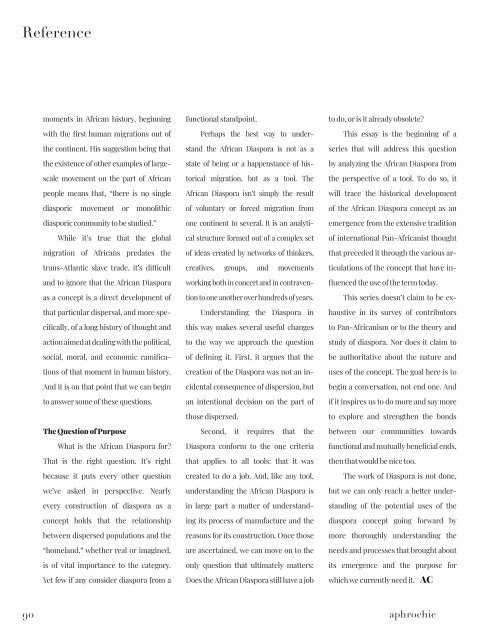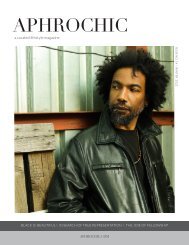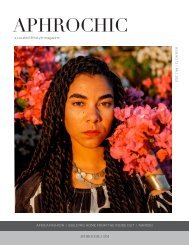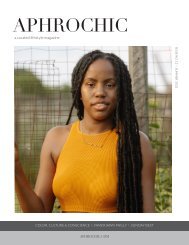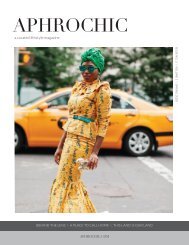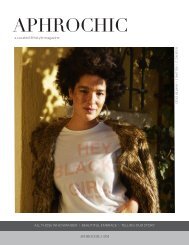AphroChic Magazine: Issue No. 1
Welcome to the Fall 2019 issue of AphroChic Magazine. Designed to celebrate the presence, innovation and accomplishments of creatives of color from all corners of the African Diaspora, we welcome the season in this issue with a focus on fashion, authentic beauty, and creating moments that bind us together. On the cover, New York fashion stylists, Courtney and Donnell Baldwin of Mr. Baldwin Style invite us to experience a fête in a historic part of Sag Harbor. We take a look inside the Brooklyn home of fashion designer and movement artist, Nana Yaa Asare-Boadu and experience her effortless aesthetic. Then, we go half way around the world on a photographic journey of Morocco, with photographer Lauren Crew. Along the way, you’ll find articles that explore the nature of the African Diaspora, the importance of the Black family home, and the books, art and accessories you’ll want to bring home this season.
Welcome to the Fall 2019 issue of AphroChic Magazine. Designed to celebrate the presence, innovation and accomplishments of creatives of color from all corners of the African Diaspora, we welcome the season in this issue with a focus on fashion, authentic beauty, and creating moments that bind us together.
On the cover, New York fashion stylists, Courtney and Donnell Baldwin of Mr. Baldwin Style invite us to experience a fête in a historic part of Sag Harbor. We take a look inside the Brooklyn home of fashion designer and movement artist, Nana Yaa Asare-Boadu and experience her effortless aesthetic. Then, we go half way around the world on a photographic journey of Morocco, with photographer Lauren Crew. Along the way, you’ll find articles that explore the nature of the African Diaspora, the importance of the Black family home, and the books, art and accessories you’ll want to bring home this season.
Create successful ePaper yourself
Turn your PDF publications into a flip-book with our unique Google optimized e-Paper software.
Reference<br />
moments in African history, beginning<br />
with the first human migrations out of<br />
the continent. His suggestion being that<br />
the existence of other examples of largescale<br />
movement on the part of African<br />
people means that, “there is no single<br />
diasporic movement or monolithic<br />
diasporic community to be studied.”<br />
While it’s true that the global<br />
migration of Africans predates the<br />
trans-Atlantic slave trade, it’s difficult<br />
and to ignore that the African Diaspora<br />
as a concept is a direct development of<br />
that particular dispersal, and more specifically,<br />
of a long history of thought and<br />
action aimed at dealing with the political,<br />
social, moral, and economic ramifications<br />
of that moment in human history.<br />
And it is on that point that we can begin<br />
to answer some of these questions.<br />
The Question of Purpose<br />
What is the African Diaspora for?<br />
That is the right question. It’s right<br />
because it puts every other question<br />
we’ve asked in perspective. Nearly<br />
every construction of diaspora as a<br />
concept holds that the relationship<br />
between dispersed populations and the<br />
“homeland,” whether real or imagined,<br />
is of vital importance to the category.<br />
Yet few if any consider diaspora from a<br />
functional standpoint.<br />
Perhaps the best way to understand<br />
the African Diaspora is not as a<br />
state of being or a happenstance of historical<br />
migration, but as a tool. The<br />
African Diaspora isn’t simply the result<br />
of voluntary or forced migration from<br />
one continent to several. It is an analytical<br />
structure formed out of a complex set<br />
of ideas created by networks of thinkers,<br />
creatives, groups, and movements<br />
working both in concert and in contravention<br />
to one another over hundreds of years.<br />
Understanding the Diaspora in<br />
this way makes several useful changes<br />
to the way we approach the question<br />
of defining it. First, it argues that the<br />
creation of the Diaspora was not an incidental<br />
consequence of dispersion, but<br />
an intentional decision on the part of<br />
those dispersed.<br />
Second, it requires that the<br />
Diaspora conform to the one criteria<br />
that applies to all tools: that it was<br />
created to do a job. And, like any tool,<br />
understanding the African Diaspora is<br />
in large part a matter of understanding<br />
its process of manufacture and the<br />
reasons for its construction. Once those<br />
are ascertained, we can move on to the<br />
only question that ultimately matters:<br />
Does the African Diaspora still have a job<br />
to do, or is it already obsolete?<br />
This essay is the beginning of a<br />
series that will address this question<br />
by analyzing the African Diaspora from<br />
the perspective of a tool. To do so, it<br />
will trace the historical development<br />
of the African Diaspora concept as an<br />
emergence from the extensive tradition<br />
of international Pan-Africanist thought<br />
that preceded it through the various articulations<br />
of the concept that have influenced<br />
the use of the term today.<br />
This series doesn’t claim to be exhaustive<br />
in its survey of contributors<br />
to Pan-Africanism or to the theory and<br />
study of diaspora. <strong>No</strong>r does it claim to<br />
be authoritative about the nature and<br />
uses of the concept. The goal here is to<br />
begin a conversation, not end one. And<br />
if it inspires us to do more and say more<br />
to explore and strengthen the bonds<br />
between our communities towards<br />
functional and mutually beneficial ends,<br />
then that would be nice too.<br />
The work of Diaspora is not done,<br />
but we can only reach a better understanding<br />
of the potential uses of the<br />
diaspora concept going forward by<br />
more thoroughly understanding the<br />
needs and processes that brought about<br />
its emergence and the purpose for<br />
which we currently need it. AC<br />
<br />
aphrochic


